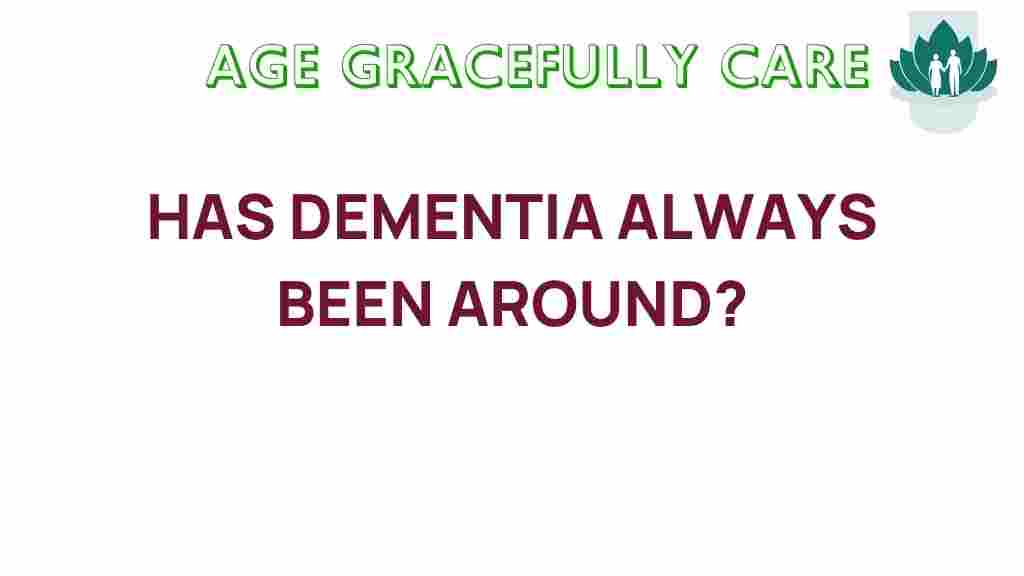Uncovering the History of Dementia: Has It Always Existed?
Dementia is a term that encapsulates a range of cognitive decline disorders, significantly impacting mental health and quality of life, particularly among the aging population. As we delve into the history of dementia, we will explore whether this condition has always existed, its manifestations throughout ancient civilizations, and how our understanding of it has evolved over time.
The Ancient Understanding of Mental Health
To understand the history of dementia, we first need to look back at ancient civilizations. Mental health issues were often attributed to supernatural forces or imbalances in bodily fluids rather than neurological disorders. Ancient Egyptians, Greeks, and Romans had varying interpretations of cognitive decline:
- Ancient Egypt: Papyrus scrolls reveal that ancient Egyptians recognized symptoms of cognitive decline, referring to it as a form of “madness” or “foolishness.” Treatments often involved spiritual rituals.
- Ancient Greece: Hippocrates, the father of medicine, emphasized the importance of the brain in mental health. He suggested that cognitive decline could result from physical ailments or environmental factors.
- Ancient Rome: Roman physicians acknowledged mental health issues, categorizing them under various terms. They considered dementia as a serious condition but lacked the knowledge of its neurological underpinnings.
These ancient perspectives laid the groundwork for future explorations into mental health and cognitive decline, although the specific term “dementia” was not used until much later.
The Etymology of Dementia
The term “dementia” comes from the Latin word “demens,” meaning “mad” or “out of one’s mind.” It wasn’t until the 18th century that the term was formally used in medical literature to describe a decline in cognitive function. This marked a pivotal point in acknowledging that cognitive decline, such as what we see in conditions like Alzheimer’s disease, is a recognized medical condition.
The Rise of Modern Medicine
As medical science progressed, especially in the 19th century, the understanding of cognitive decline evolved significantly. The incorporation of neurology into medicine allowed for a more profound understanding of neurological disorders:
- Emil Kraepelin: In the late 1800s, Kraepelin classified various forms of dementia, distinguishing between them based on symptoms and progression.
- Alois Alzheimer: In 1906, Alzheimer identified a specific type of dementia that now bears his name, marking a significant milestone in the history of dementia.
Understanding Cognitive Decline
Today, cognitive decline is understood as a spectrum of disorders, with dementia being a significant aspect. The most common forms include:
- Alzheimer’s Disease: Characterized by memory loss and cognitive decline.
- Vascular Dementia: Resulting from reduced blood flow to the brain.
- Lewy Body Dementia: Involves abnormal protein deposits in the brain.
- Frontotemporal Dementia: Affects the frontal and temporal lobes, leading to changes in personality and behavior.
The increasing prevalence of these disorders among the aging population emphasizes the importance of understanding the history of dementia and its impact on mental health.
Healthcare and Dementia Today
In contemporary healthcare, dementia is recognized as a significant public health challenge. As the global population ages, the incidence of dementia is expected to rise. Effective management requires:
- Early Diagnosis: Identifying symptoms early can help in managing the condition better.
- Support Systems: Caregivers and family members play a crucial role in the care of individuals with dementia.
- Research and Awareness: Ongoing research into the causes and treatments of dementia is essential.
For more information about the current state of dementia research, you can visit this NIH resource.
Tracing the Evolution of Treatment
Throughout history, treatments for dementia have varied widely, reflecting societal attitudes toward mental health:
- Ancient Treatments: Included herbal remedies, spiritual healing, and even bloodletting.
- Medieval Period: Treatments were often religious or superstitious, focusing on exorcism or prayer.
- 20th Century Advances: Introduced medication, therapy, and support groups aimed at improving quality of life.
Challenges in the Modern Era
Despite advancements in understanding dementia, several challenges persist:
- Stigma: Many people still view dementia through a lens of fear and misunderstanding, leading to social isolation.
- Access to Care: Not everyone has equal access to healthcare resources, which can impact diagnosis and treatment.
- Research Funding: While awareness is increasing, funding for dementia research still lags behind other diseases.
Future Directions in Dementia Care
Looking ahead, several initiatives are essential for improving the healthcare landscape for dementia patients:
- Increased Awareness: Public education campaigns can help reduce stigma and promote understanding.
- Innovative Research: Continued investment in research can lead to breakthroughs in treatment and prevention.
- Integrated Care Models: Collaboration among healthcare providers, caregivers, and families can improve patient outcomes.
Conclusion
The history of dementia reveals a complex journey from ancient misunderstandings to a modern recognition of cognitive decline as a medical condition requiring comprehensive care. As our population ages, understanding the nuances of dementia and its impact on mental health becomes increasingly critical. We are at a pivotal moment, where increased awareness, ongoing research, and improved healthcare practices can make a significant difference in the lives of those affected by dementia. The journey of uncovering the history of dementia is ongoing, and with it, the hope for better treatment and understanding arises.
For more insights into mental health and cognitive decline, check out our other articles on mental health resources.
This article is in the category Health and created by AgeGracefullyCare Team
